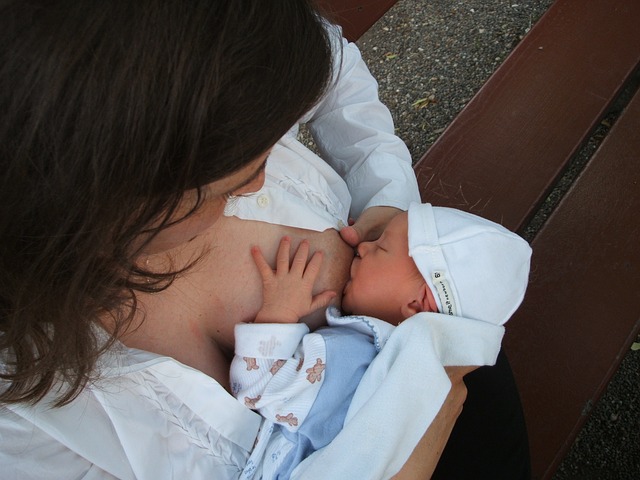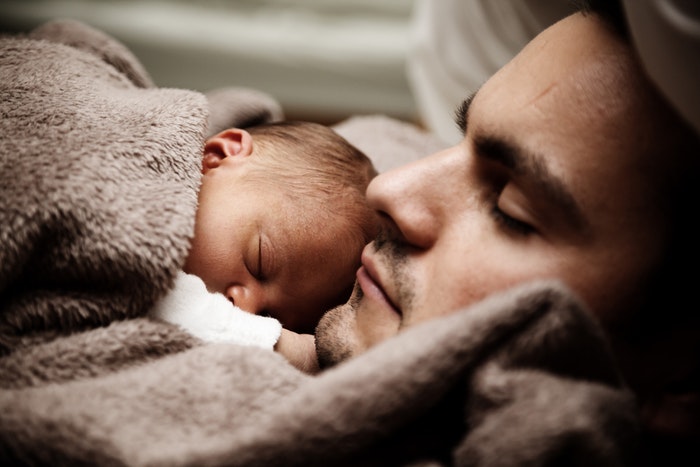Sudden Infant Death Syndrome or SIDS happens when a healthy baby dies suddenly and with no apparent cause of death. This has now become the leading cause of death in babies under 4 months, which recorded over 3600 deaths in the US in 2016. Although the cause of SIDS is unknown, there are avoidable risk factors and preventable techniques. Here are the 5 reasons why breastfeeding reduces SIDS.
Story Time
It wasn’t until I started to learn more about newborn care that I understood that SIDS. Just knowing that breastfeeding helps to prevent it made me even more determined to breastfeed.
In my personal experience of co-sleeping with my boys, it meant I was nursing them longer at night, and through our skin to skin contact it helped to regulate their breathing and body temperature.
In A Nutshell…
- SIDS is the unexplained death of a healthy newborn during their sleep. This is now considered the leading cause of death in babies less than 4 months old.
- There are many associated risk factors to SIDS, including their physiology and sleeping environments.
- Breastfeeding has been shown to reduce the risk of SIDS for babies that have been exclusively breastfed for at least 2 months by at least 50%. Breastfeeding can boost the baby’s brain development, strengthen their immune system, promote safer sleep, increase maternal awareness, and support the baby’s suck and swallow coordination.
- There are other measures a mother can take to prevent SIDS. Mothers should adopt a healthier lifestyle like quitting smoking, limiting alcohol consumption, and improving their baby’s sleeping environment. Co-sleeping without bed-sharing is encouraged by the AAP, which prevents the risk of SIDS by half.
What is SIDS?

Sudden infant death syndrome (SIDS) is the unexplained death of healthy babies less than a year old. This usually occurs during sleep, which is why many have also coined it as the crib death. Despite the fact that the cause of SIDS is unknown at the moment, there are many associated developmental problems and risk factors linked to the respiratory system of the child.
Scientists are still trying to figure out the potential causes of SIDS. It has been investigated to be linked to a form of sleep apnea or abnormality in the brain regulating respiration. However, when the baby reaches 6 months, the risk of dying from SIDS lowers.
Risk Factors for SIDS
Although the direct cause has not been known yet, SIDS is related to several risk factors. A few risk factors are preventable and managed. Be aware of the following:
Physical Factors
- Defects in brain development
- Infection in the baby’s respiratory system
- Low birth weight
- Premature babies
- Babies born in multiples (twins, triplets, etc.)
- Race: Being African-American or Native American are at higher risk for SIDS
- Young mothers who gave birth before they turned 20
Lifestyle and Sleep Environment Factors
- Mothers who smoke and babies who receive secondhand smoke
- Nursing with infant formula
- Overheating
- Unhealthy sleeping habits and environment
- Using old and worn out cribs
- Using mattresses that are too soft
- Cribs containing soft objects
- Babies sleeping on their stomach or side before they turn one
How Breastfeeding Reduces SIDS

Breastfeeding is regarded as the most optimal source of nutrition for your child, as it can give a variety of benefits for both the mother and baby. Recent studies have given stronger evidence that breastfeeding is the best measure a mom can do to prevent SIDS from happening. The 2017 study found that exclusively breastfeeding for the first 2 months of life reduced the risk of SIDS by half.
The relationship between breastfeeding and SIDS was apparent in the frequency of nursing. This meant that the more you breastfeed your newborn, the greater they are protected against SIDS. Thus, the American Academy of Pediatrics (AAP) encourages mothers with newborns to breastfeed as often and for as long as they to maximize its benefits in preventing SIDS.
As mentioned earlier, newborns and younger infants are more vulnerable to SIDS since they are still in a critical period of development. However, since breastfeeding contains the essential nutrients and substances needed in the baby’s proper growth and development, it’s deemed to contribute to the protection against SIDS through the following ways:
Boosts brain development
Breast milk contains fatty acids and other fatty substances that help support brain development. In particular, it boosts the development of the central nervous system, which takes charge of the breathing and respiratory control while the baby is sleeping.
Strengthens the immune system
A newborn’s immune system is generally still weak. They are more susceptible to viral or bacterial-based diseases which can affect their breathing pathways while sleeping. SIDS has been shown happen more likely when a baby has had a minor infection a few days prior.
Breastfeeding helps in strengthening the immunity of a baby since breast milk, especially in the early stages of lactation, contains antibodies and immunity boosting properties. In particular, it can protect against the respiratory syncytial virus (RSV) which can result in death due to SIDS.
Promotes better and safer sleep
Ever wonder why newborns don’t get to sleep throughout the night? It might be their body’s own preventive mechanism against SIDS. A baby less than 2 to 4 months are at greater risk for SIDS when they fall into deep and lengthy slumbers.
Breastfed babies are shown to have periodic sleeping schedules compared to those that are formula-fed. This has been deemed to be a healthier sleeping habit for newborn babies.
Increases maternal awareness
Prolonged periods of mother and baby contact, especially through breastfeeding, can increase the mother’s instinct and awareness over their baby’s health. Whenever there is a sign of distress, breastfeeding mothers will be able to interpret how their babies feel.
This bonding experience can be shared even while sleeping. The AAP is now recommending the practice of co-sleeping, wherein babies sleep in closer to their parents, for at least the first year. The habit of sharing a room with your baby during the night can reduce the risk of SIDS.
Support suck/swallow coordination
The latching and suction of a baby when they breastfeed helps in developing the muscles around the oral cavity and throat. The sucking and swallowing coordination improves their breathing and helps keep their respiratory airways open while they are sleeping.
Other Ways To Prevent SIDs

The risk factors discussed earlier are primarily related to the mother’s lifestyle and the baby’s sleeping environment. Prevent SIDs from happening through these healthy methods.
The mothers should:
- Stop smoking, avoid drinking alcohol, and do not use drugs while pregnant and after they have given birth. Keep the baby away from inhaling any secondhand smoke.
- Avoid exposing babies in hot environments, especially while they are sleeping.
- Schedule to visit your pediatrician and get the necessary immunizations for your baby.
Here’s how you can create a safer and healthier sleeping environment for your baby:
- Co-sleeping in the same room without bed-sharing has been recommended by the AAP as there has been sufficient evidence to say that it decreases the risk of SIDS for as much as 50%
- Make it a habit for your baby to sleep on their back during naps and slumbers.
- Use a firm sleeping surface for your baby to sleep on. Put tight fitting beddings on the crib mattress.
- Avoid putting too many soft toys, stuffed animals, loose beddings, or pillows as they can suffocate or strangle your baby
- Bed-sharing has been a controversial practice due to its safety and there not many studies done as of the moment that can assure that this is harmless. Instead, you can keep the bassinet or crib closer to your bed and wait until they are older (6 months above).
The Takeaway…
Sudden Infant Death Syndrome or SIDS is the most common cause of death for newborns under 4 months old. This is an unexplained death that occurs while a healthy baby is sleeping. Although its causes are unknown, there are many associated risk factors which are linked to the baby’s poor brain development and respiratory problems.
The latest research has proven sufficient evidence to show that breastfeeding can reduce the risk of SIDS in babies who have been exclusively breastfed. Breastfeeding protects against SIDs as it is able to boost brain development, strengthen the immune system, promote safer sleep, increase maternal awareness, and support the suck and swallow coordination. All of these mentioned benefits can improve the babies breathing while they sleep, and thus, prevent SIDS from happening.
Since several of the risk factors that contribute to SIDS are preventable and manageable, mothers are encouraged to adopt healthier lifestyle habits and improve their baby’s sleeping environment.






